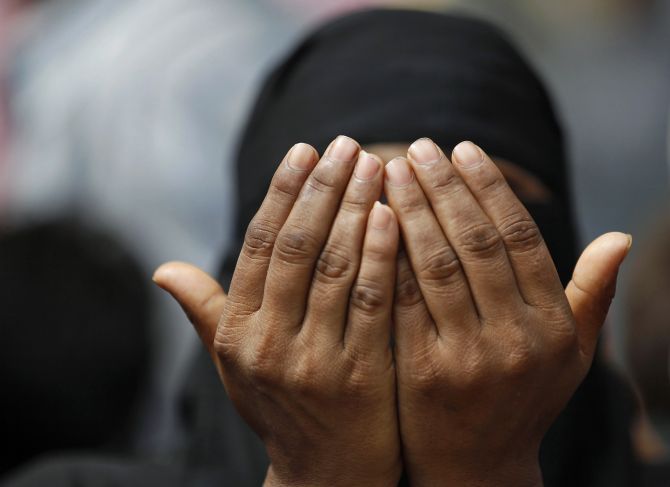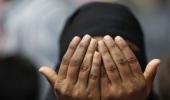
The Supreme Court on Thursday commenced its historic hearing on a clutch of petitions challenging the constitutional validity of the practice of triple talaq and nikah halala among Muslims, saying it would first determine whether the practice is fundamental to Islam.
A five-judge constitution bench, headed by Chief Justice J S Khehar, however, made it clear that the issue of polygamy among the Muslims may not be deliberated upon as it is not connected with the triple talaq issue.
“We will deal with the issue as to whether triple talaq is sacramental and whether it can be enforced as a Fundamental Right,” the bench, also comprising Justices Kurian Joseph, R F Nariman, U U Lalit and Abdul Nazeer, said while framing the issue to be deliberated upon.
The apex court also said if it came to the conclusion that triple talaq is fundamental to religion, then it will not go into the question of its constitutional validity.
The bench said it will also deal with the aspect of whether triple talaq formed part of the enforceable Fundamental Right to practice religion under the Constitution.
Senior advocate Amit Singh Chadha, appearing for Saira Bano, one of the petitioners in the case, initiated the arguments against the practice of triple talaq among Muslims and said this practice was not fundamental to Islam and hence can be done away with.
He also referred to the practices in the neighbouring Islamic countries like Pakistan and Bangladesh to buttress his plea that triple talaq is un-Islamic.
The bench intervened and said it would like to peruse the prevalent laws in various Islamic countries on the issue.
Another senior advocate Indira Jaising, appearing for one of the petitioners, said in case of divorces being granted through extra-judicial mechanism, there should be a “judicial oversight” to deal with the consequences.
Former Union Minister and senior advocate Salman Khurshid, who is assisting the court in his personal capacity, termed triple talaq as a “non-issue” saying it is not considered complete without conciliation efforts between the husband and the wife.
He said there was no adjudication to determine the validity of the grounds of talaq.
When the bench asked whether reconciliation after the pronouncement of triple talaq in one go is codified, Khurshid replied in the negative.
Another former Union Minister and counsel for All India Muslim Personal Law Board, Kapil Sibal, concurred with Khurshid and said “it’s a non-issue, as no prudent Muslim would wake up one fine morning and say talaq, talaq and talaq”.
The bench continued with the hearing in the post-lunch session.
The pleas before the apex court have also challenged the constitutional validity of other practices like ‘nikah halala’ and polygamy among the Muslims.
The bench is also taking up the main matter on its own as a petition titled “Muslim Women’s quest for equality”.
The apex court had on its own taken cognisance of the question whether Muslim women faced gender discrimination in the event of divorce or due to other marriages of their husbands.
The hearing assumes significance as the apex court has decided to hear the case during the summer vacation and is likely to sit on Saturdays and Sundays to expeditiously decide the contentious and sensitive issues arising in the matter.
It holds importance as the Allahabad high court, in its verdict pronounced in the last week of April, had held the practice of triple talaq as unilateral and bad in law.
The high court had given its verdict while dismissing a petition filed by one Aaqil Jamil whose wife had filed a criminal complaint against him alleging that he had tortured her for dowry and when his demands were not met, he gave her triple talaq.
The apex court had on March 30 said that the Muslim practices of triple talaq, nikah halala and polygamy are issues that are “very important” and involve “sentiments”.
Influential Muslim organisations like the AIMPLB have opposed the court’s adjudication of these matters, maintaining that these practices stemmed from the Holy Quran and hence not justiciable.
The Muslim women, who have filed the petitions, have challenged the practice of triple talaq in which the husband, quite often, pronounces talaq thrice in one go, sometimes even by phone or text message.
Nikah Halala is a practice intended to curb the incidence of divorce under which a man cannot remarry his former wife without her having to go through the process of marrying someone else, consummating it, getting divorced, observing the separation period called ‘Iddat’ and then returning to him.
Earlier, the apex court, while referring to the matter to a larger bench, had observed that “sentiments” were involved in it and a five-judge constitution bench would adjudicate the issue which needed a detailed hearing.
The court had said it would decide the issues pertaining to the legal aspects of the practices of triple talaq, nikah halala and polygamy among Muslims, but would not deal with the question whether divorce under Muslim law needs to be supervised by courts as it fell under the legislative domain.
The Centre had on October 7 last opposed in the Supreme Court the practice of triple talaq, nikah halala and polygamy among Muslims and favoured a relook on the grounds like gender equality and secularism.
AIMPLB had on March 27 told the apex court that pleas challenging such practices among Muslims were not maintainable as the issues fell outside the realm of the judiciary.
The Board had also said the validity of the Mohammedan Law, founded essentially in the Holy Quran and sources based on it, cannot be tested on particular provisions of the Constitution.
It had said there was a need for “judicial restraint” before going into the constitutional interpretation of these issues unless such an exercise becomes unavoidable.
The ministry of law and justice, in its affidavit, had referred to the constitutional principles like gender equality, secularism, international covenants, religious practices and marital law prevalent in various Islamic countries to drive home the point that the practice of triple talaq and polygamy needed to be adjudicated upon afresh by the apex court.
Debate intensifies
Several organisations voiced their opinion on the matter that has polarised the community between the orthodoxy and the reformists. While some termed it a religious matter that the community should resolve, others expressed faith that the judiciary would deliver justice to Muslim women.
All India Shia Personal Law Board spokesperson Maulana Yasoob Abbas said he welcomed the Supreme Court’s observation. “Time has now come to decide whether Prophet’s Islam will reign supreme or the Islam of a selected few mullahs.”
"Many Muslim countries have already put an end to the practice as it is directly linked to the lives of Muslim women. In the Shia community, there has been no place for ‘triple talaq’ in one go," he added.
Sharing his view, All India Muslim Women Personal Law Board president Shaista Amber said the Supreme Court’s comment on enforceable fundamental right was historic and ‘the decision of the Supreme Court will definitely benefit Muslim women and uphold their dignity’.
"Today is a day of hope of betterment and justice for Muslim women. At least we now feel that the betterment of Muslims has started," she said.
Taking a counter view, some clerics reiterated their stance that the petitions challenging the validity of triple talaq were politically motivated and that the practice was part of Muslim personal law.
All India Muslim Majlis-e-Mushawarat president Navaid Hamid said, "It is a religious issue. The Supreme Court should give the Muslim community more time evolve a strategy and resolve this contentious issue."
"The All India Muslim Personal Law Board clearly says that triple talaq is a part of Islam. These petitions are politically motivated,” added Maulana Kazmi, a cleric.
AIMPLB member and senior advocate Zafaryab Jilani said triple talaq is part of Muslim personal law but ‘misusing it is a sin’.
His colleague, Maulana Khalid Rasheed Firangi Mahali, executive member of the AIMPLB, was of the view that only 0.1 per cent of men were misusing it.











 © 2025
© 2025